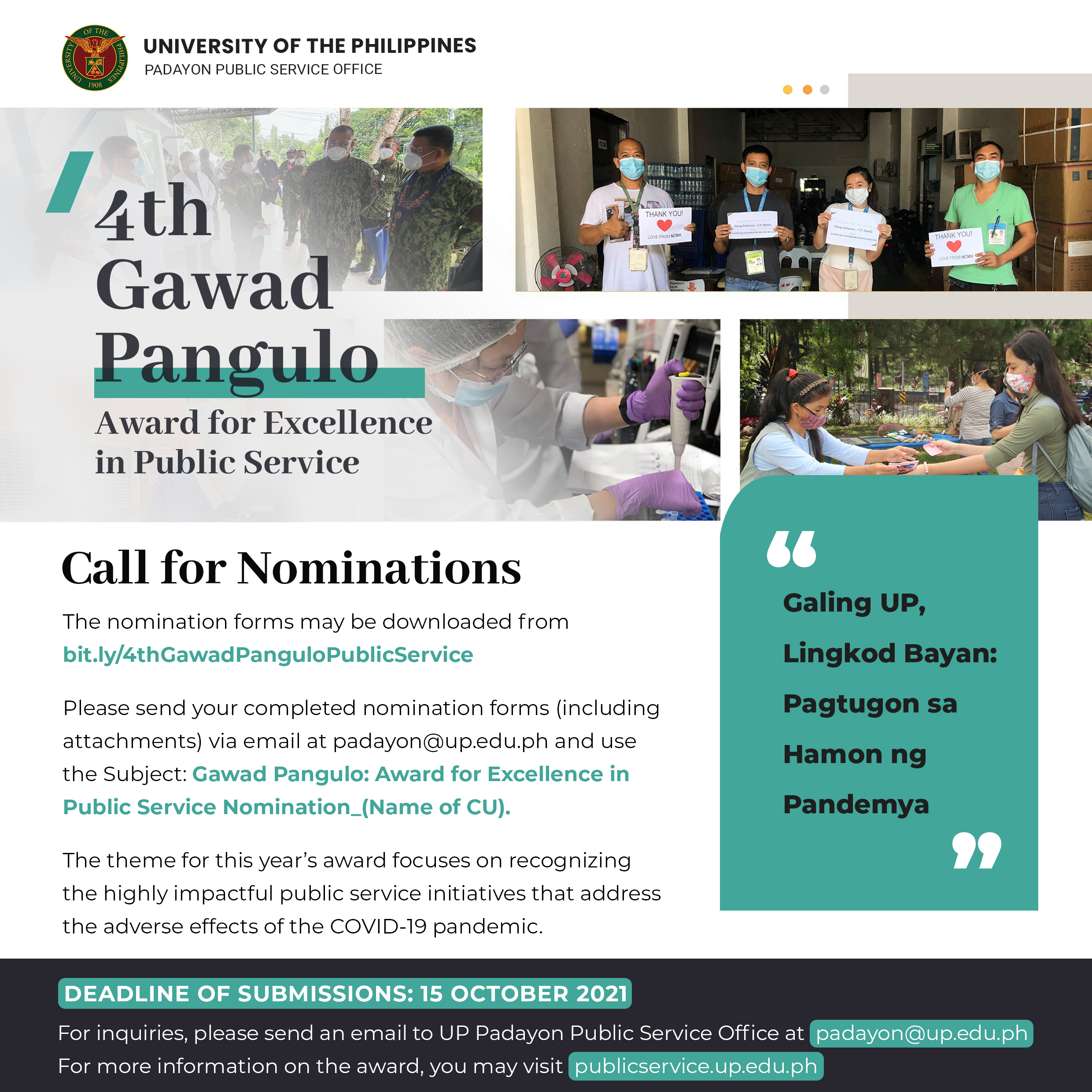The pandemic has affected and changed practically every aspect of our lives. Some may have changed for the better, others ended being worse, and a few had a little of both. Regardless of the type of change we had, we can’t deny that our health has been immensely impacted by the current situation, especially that […]
Author: Padayon UP
The University of the Philippines, through the Padayon Public Service Office, has made the Call for Nominations to the fourth Gawad Pangulo: Award for Excellence in Public Service. This year’s theme, “Galing UP, Lingkod Bayan: Pagtugon sa Hamon ng Pandemya,” aims to award 15 excellent and outstanding COVID-related public service initiatives facilitated and implemented by faculty and staff in all UP Constituent Universities.
As the culture of research and extension continues in the University amid the COVID-19 pandemic, the Tuklas UPLB segment under Radyo DZLB’s Galing UPLB! program got off the ground with informative and inspiring discussions on plant disease research and volunteerism in UPLB.
May 2021 marked the launch of Tuklas UPLB, becoming the newest addition to the Galing UPLB! program. The segment’s name “tuklas” means to discover – a Filipino term fit to use when talking about the research and extension (R&E) outputs and activities that UPLB is known for. It also showcases first-hand narratives of hardworking and outstanding UPLB REPS and faculty members.
The Human Resources Development Office (HRDO) will hold a webinar series to orient administrative support staff of UPLB on how to fill in a template guide to hire personnel under individual contracts of service or ICS.
The featured guests of Tuklas UPLB in July showed that UPLB remains true to its mission to serve the public through its research and extension activities, especially during this pandemic. They discussed the role and applications of mathematics in improving the government’s response to COVID-19, and the potential of edible landscaping technology toward food self-sufficiency of Filipinos.
The Department of Biological Sciences and Environmental Studies (DBSES) and Department of Food Science and Technology (DFST) and the Department of Humanities (DH) of UP Mindanao in partnership with the Philippine Genome Center (PGC) Mindanao put forward a public service program for Mindanao researchers and collaborators through research assistance coupled with technical support on species identification. The sets of data generated from this research may contribute to a broad range of applications from taxonomy, biodiversity conservation programs, and opportunities for bio-economy in Mindanao that can significantly help Philippine biodiversity.
Edible landscaping is gaining importance as rising food prices, food nutrition and food security remain major pressing issues today, said Fernando Sanchez Jr., professor and project leader of the UPLB-CAFS Edible Landscaping unit. Currently, approximately two out of three Filipino households experience food insecurity, he cited.
Sanchez said edible landscaping aims to achieve the four goals of aesthetics, functionality, health and wellness, and self-sufficiency. “With edible landscaping, we can establish attractive and functional spaces.”
The Department of Science and Technology-Philippine Council for Health Research and Development (DOST-PCHRD), University of The Philippines-Manila (UPM), and Fondazione Italiana Fegato (FIF) have signed a memorandum of understanding (MOU) seeking to develop and promote scientific and technological cooperation on translational hetapology through joint research and development, grant of scholarships and research fellowships, and exchange of scientists, experts and researchers for studies, and training.
The clinical trial on tawa-tawa (Euphorbia hirta) as a potential adjunctive treatment for mild and moderate cases of coronavirus disease 2019 (COVID-19) is nearing completion, according to Dr. Philip Ian Padilla, vice chancellor for academic affairs of the University of the Philippines Visayas (UPV).
Padilla, a professor of Microbiology, is the principal investigator of the trial – a collaborative effort of UPV, Department of Science and Technology (DOST), Corazon Locsin Montelibano Memorial Regional Hospital in Bacolod City, Philippine Red Cross-Manila, and Quezon Institute.
DILG-NCR Regional Director Maria Lourdes Agustin and University of the Philippines Diliman Chancellor Dr. Fidel Nemenzo signed an agreement to promote an integrated solid waste information and technology management system, and the setting up of waste utilization technologies in NCR.
DILG-NCR and UP partnered for the Project IWASTO or the Integrated Waste Analysis, Survey, and Technological Options, a component of the program Integrated Mapping, Monitoring, Modelling, and Management System for Manila Bay and Linked Environments or the IM4ManilaBay, funded by the Department of Science and Technology-Philippine Council for Industry, Energy, and Engineering Technology Research and Development (DOST-PCIEERD).



